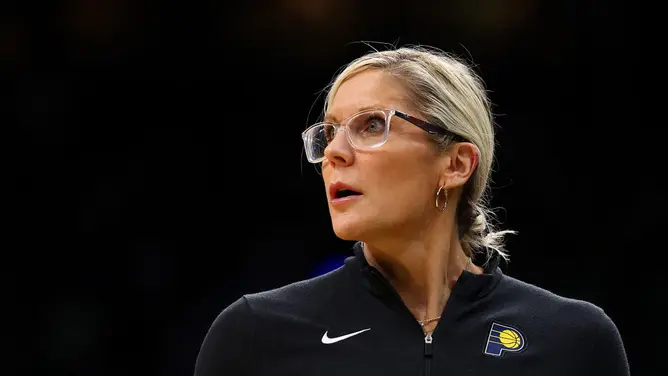The NBA Finals concluded over a month ago, but the significance of what unfolded during the series still echoes powerfully across the basketball world and beyond. At the center of this historic moment was Jenny Boucek, the Indiana Pacers assistant coach who broke a monumental barrier by becoming the first female assistant coach to participate in the NBA Finals. This milestone is not just a noteworthy headline; it represents a profound shift in the landscape of professional sports, signaling progress toward greater gender inclusion and equality in a traditionally male-dominated arena. Jenny Boucek’s role in the Finals deserves a proper and detailed recognition because it embodies years of perseverance, skill, and trailblazing spirit that will inspire future generations of women in sports.
Jenny Boucek’s journey to this pinnacle was neither accidental nor handed out lightly. She has long been a respected figure in basketball circles, known for her sharp basketball mind, tactical acumen, and dedication to the game. Before stepping into her coaching role with the Pacers, Boucek played professionally overseas and in the WNBA, where she developed a deep understanding of the sport from a player’s perspective. Her transition into coaching was marked by a steady climb through the ranks, from player development roles to assistant coaching positions across the NBA. Each step in her career not only honed her expertise but also showcased her ability to break down barriers and challenge preconceived notions about women’s roles in professional basketball.
The NBA Finals is the most-watched, most-worshipped stage in basketball, a global event that draws millions of viewers and intense media scrutiny. For a woman to be part of the coaching staff in such a high-stakes environment sends a powerful message about evolving attitudes in sports organizations. Historically, coaching roles in the NBA have been exclusively male, with women often relegated to front-office or administrative positions, if involved at all. Boucek’s presence on the sidelines during the Finals indicates that professional teams are now more willing to embrace diversity and acknowledge the immense value that women bring as tactical leaders and mentors. It also challenges young girls and aspiring female coaches to dream bigger and believe that they can reach the highest echelons of basketball, irrespective of gender.
Boucek’s impact goes beyond the symbolic nature of her position. She has actively contributed to the Pacers’ game plans and player development, working closely with athletes to improve their skills and adapt strategies during the series. Her ability to communicate, strategize, and motivate players under immense pressure helped shape the team’s performance during the Finals. It is crucial to emphasize that her role was earned on merit, expertise, and results, not merely as a token appointment. This underscores a broader shift in the sports world toward evaluating talent and leadership based on ability rather than outdated biases or stereotypes.
The significance of Jenny Boucek’s role also resonates on a societal level. Sports have long been a reflection of cultural norms and values, often perpetuating traditional gender roles. When a woman steps into a role as visible and influential as coaching in the NBA Finals, it challenges these norms and contributes to the broader movement for gender equality across all professional fields. Boucek’s achievement is a beacon of progress in the ongoing effort to dismantle systemic barriers that have limited women’s participation and advancement in sports leadership roles.
Moreover, Boucek’s presence in the NBA Finals serves as a critical example for other professional sports leagues and organizations. The WNBA has long been a leader in promoting women’s involvement in basketball, but the NBA, as a larger and more widely followed league, carries significant cultural weight. By integrating women into high-profile coaching positions, the NBA sets a precedent that can influence other leagues and sports to follow suit. This ripple effect can lead to increased hiring of women coaches, trainers, and executives, further normalizing gender diversity in professional athletics.
Jenny Boucek’s journey also highlights the importance of mentorship and support networks for women in sports. Her career has been shaped by allies and advocates who recognized her talent and provided opportunities for growth. This underscores the need for organizations to create environments where women feel welcomed, supported, and given equal access to professional development. The NBA and its teams must continue to build on this momentum by fostering inclusive cultures, offering mentorship programs, and actively recruiting women for coaching and leadership roles.
The media coverage of Boucek’s achievement has been widespread, yet it also reveals ongoing challenges. While many celebrated her breakthrough, some narratives focused disproportionately on her gender rather than her coaching qualifications and accomplishments. This kind of coverage, though well-meaning, can unintentionally reinforce the idea that a woman in this role is an anomaly rather than a natural fit. Moving forward, it is essential for media outlets and commentators to emphasize the expertise and impact of female coaches like Boucek on an equal footing with their male counterparts. Recognizing women’s contributions without exoticizing or minimizing them will help normalize their presence in high-level sports leadership.
From a historical perspective, Jenny Boucek’s presence in the NBA Finals will be remembered as a watershed moment. Future basketball historians and analysts will look back at the 2025 Finals as a turning point where gender barriers began to erode significantly within the NBA coaching ranks. Just as players like Lisa Leslie and Diana Taurasi transformed the perception of women’s basketball through their on-court excellence, Boucek is helping to redefine what is possible for women off the court, particularly in leadership and strategic roles. Her legacy will likely inspire a new generation of female coaches who will push even further into roles once thought inaccessible.
It is also worth considering the broader cultural implications of this milestone. Sports often serve as a microcosm of society, reflecting and influencing social attitudes. When women achieve visibility in areas previously dominated by men, it helps shift public perceptions about gender roles and capabilities. Boucek’s role in the NBA Finals contributes to breaking down stereotypes not only within sports but also in workplaces and communities where women continue to fight for equal representation and respect. The normalization of female coaches in major leagues like the NBA helps pave the way for broader gender equity.
Looking ahead, the challenge will be to ensure that Jenny Boucek’s achievement is not an isolated incident but part of a sustained trend. The NBA and other professional sports organizations must take deliberate steps to cultivate pipelines for women in coaching. This includes investing in training programs, offering internships and apprenticeships, and removing systemic barriers that hinder women’s progress. Additionally, recognizing and rewarding successful female coaches will encourage others to follow in Boucek’s footsteps. Her historic presence in the Finals should mark the beginning of a new era where coaching staffs in professional basketball regularly feature diverse voices and perspectives.
Jenny Boucek’s story is one of resilience, dedication, and breaking boundaries. Her historic role in the NBA Finals symbolizes much more than just a coaching appointment; it is a cultural milestone that champions progress, inclusion, and equality. The NBA community, basketball fans, and society at large owe her a proper shout-out for paving the way toward a more inclusive future in sports. As the league moves forward, the hope is that her legacy will inspire countless others to pursue their dreams unapologetically and demonstrate that leadership in basketball — and in any field — is not defined by gender but by talent, vision, and commitment.
In the end, Jenny Boucek’s achievement in the NBA Finals stands as a testament to how far we have come and how much potential remains to be unlocked when barriers fall away. It is a powerful reminder that progress is possible when organizations embrace diversity and empower individuals regardless of their background. The basketball world has witnessed a historic moment, and its ripples will be felt for years to come. As fans, analysts, and aspiring professionals reflect on this milestone, the message is clear: the future of basketball coaching is diverse, inclusive, and brighter for it. Jenny Boucek’s legacy is not only etched into the history books of the NBA Finals but also in the hearts and minds of everyone who believes in equality and the power of perseverance.



